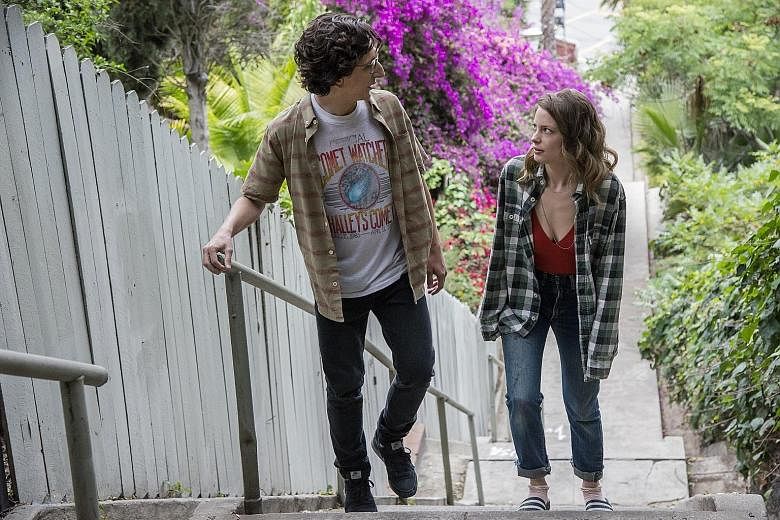REVIEW / DRAMA-COMEDY
LOVE
Netflix
2.5/5 stars
Love is a con, the fraud being that the show so named in these cynical times would have you believe it is an anti-romcom.
Created by writer-director Judd Apatow (Knocked Up, 2007), the new Netflix series deserves some credit for trying to be a non- traditional romantic comedy in some respects.
For one thing, protagonists Gus (Paul Rust) and Mickey (Gillian Jacobs) are deeply flawed - his gentle, nerdy exterior belying a passive-aggressive self-righteousness and she is often breathtakingly selfish when it comes to her friends.
Given that most relationship comedies highlight such failings only if they are cute or easily surmountable, this is quite brave. After the pair meet, the series spends as much time showing them apart as it does them together, which is refreshing too.
And the writers take pointed digs at the genre, like in a scene where Gus hurls Blu-ray discs of romcoms out of a moving car while reciting the falsehoods about romance that each promotes.
All this sets Love apart from other shows and films of this ilk. There is both comedy and insight to be gleaned from the characters' foibles and romantic disillusionment, even if a lot of the laughs come with a side of squirm.
But Love's good intentions are undermined by its sly embrace of more insidious genre tropes.
Gus and Mickey have the predictable, if slightly underwhelming, "meet cute" - a contrived coincidental encounter at a convenience store when he rescues her from a morning sans coffee and cigarettes.
Another trope the show embraces is a more recent staple of the genre, thanks in part to Apatow himself and films such as Knocked Up - the male lead is allowed to deviate from the usual Hollywood standards of attractiveness but the woman is not.
Apatow (along with Rust) is himself a nerdy dude married to a skinny, beautiful woman, actress Leslie Mann - so it may seem reasonable that his heroes would be similar.
But it is telling how rarely such progressive casting swings the other way to embrace women. It seems to happen only when Apatow collaborates with actresses such as Lena Dunham (Girls, 2012 to present) and Amy Schumer (Trainwreck, 2015), who have enough clout to flout the double standard - and do so at considerable personal cost going by even a cursory look at the online attacks hurled at both for daring to put themselves centre stage.
The Internet trolls are curiously silent, however, when an uber-dork such as Gus has not one but four attractive women throw themselves at him over the course of the first season (a second is already in the works).
The only time the show acknowledges the aesthetic gap is in an odd scene where Mickey's roommate says she "went through a phase where I was loving having sex with very unattractive men". Their neighbour declares: "Oh yeah, that was my move, all women go through that phase."
With no equivalent scene showing male characters revealing their own cruel dating calculus, it feels that Apatow, Rust and the other writers may be working out some of their own demons after being used and abused by desirable women.
As Gus says to Mickey, he is "not going to be some nice guy for you to f*** around with".
Male wish fulfilment also seems to be driving the hot chick-nerd pairing; likewise a scene where two of Mickey's exes (plus a third on the phone) gang up and call her out on previous relationship transgressions.
All this is compounded by the overall asymmetry in Love's approach to Gus and Mickey's flaws - flaws that the show's creators repeatedly trumpet as setting the series apart from others like it.
He is awkward, ineffectual and clueless, yet time after time, it is her insecurities and shortcomings (which include some serious addictions) that outstrip his own. She is also churlish, ungrateful and occasionally conniving and ditsy - just a worse person in general and she knows it too.
The show has no voiceover narrator, but cheats by having the relationship guru at the radio station Mickey works at analyse her, as do people at her addiction support group.
The acting lets down the show too, especially with the leads, whose chemistry often feels forced.
Generously interpreted, Rust's blahness could be his restrained take on Gus, but Jacobs grabs what could have been a sympathetic figure and reduces her to a pouting, glowering caricature.
There are far better relationship comedies and shows with flawed protagonists, among them Togetherness and Dunham's Girls, both on HBO and far funnier and sharper.
Yet to air in Singapore is You're The Worst, which is similar to Love in its set-up, but more even-handed in the selfishness of its two leads and revealing in its look at addiction.
Love is the only one, however, that you can binge-watch and its creators should be thankful for that because it is hard to imagine many viewers sticking with it otherwise.


